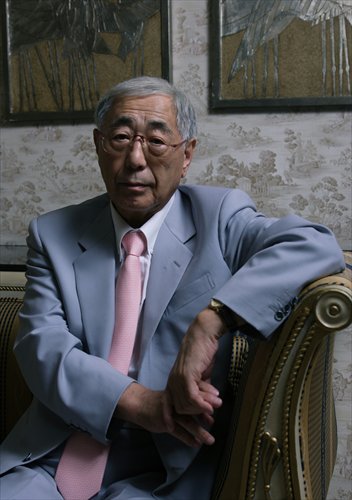HOME >> ARTS
Lost paradise
By Xu Ming Source:Global Times Published: 2014-5-7 20:23:01

Japanese writer Junichi Watanabe Photo: CFP
Junichi Watanabe, crowned by Chinese readers as the master of romance novels, died in his home in Tokyo from prostate cancer on April 30, leaving millions of his fans mourning the loss.
On China's Sina Weibo, his readers posted images of a candle to say goodbye and wish the 80-year-old Japanese writer peace in another world.
An unspeakable love
Sex, love, extra-marital affairs, incestuous relationships and repressed desire. These are the themes that can be regarded as the key foundational blocks that constitute the worlds Junichi Watanabe created for almost half a century.
A productive writer, Watanabe was the author of over 150 novels and books of prose. He was also the winner of innumerable prizes in literature, including the Naoki Prize for Light and Shadow in 1970 and the New Current Coterie magazine prize for Makeup just to name a few.
Watanabe is best known for A Lost Paradise (1997), which tells the tale of a tragic extra-marital affair between a former magazine editor frustrated with his marriage and a typesetter who constantly suffers the indifference of her husband. At the end of the novel the two choose to die together as a way to put their love to a beautiful end.
With an intricate plot, plenty of sex and fine writing, the novel became a best-seller throughout Asia. It was later made into a film and a TV series, stirring a crazy sensation across Japan.
Just like A Lost Paradise, Watanabe's works mostly focus on love between men and women and the emotional entanglements of middle-aged people. However, he distinguished himself from others with his illustration of love and desire that stands in conflict with traditional social ethics and morality.
"The love in my works cannot be explained by philosophy or morality, but it does exist," he once explained to the media during a visit to China in 2007.
While many call him an "expert in extra-marital love," he disagreed with the idea, saying his works were much more than that. "Love changes with time… I write about the nature of humanity and real changes involving emotion."
One important feature of his works is the large amount of space dedicated to descriptions of sex, a fact which has made him a controversial writer in both Japan and other countries. "I write about sex not to attract readers, but to let readers experience the uglier side of sex," he explained.
"He carries out a deep analysis of physical sensations while also focusing on emotion. He has no parallel in either China or Japan," commented Zhu Jiarong, the translator for the Chinese version of A Lost Paradise. She thinks that his focus on sex is partly due to his early experiences as a doctor.
Rising popularity
Most Chinese readers know Watanabe through the Chinese version of A Lost Paradise, which was published in China in 1998. Though an abridged version, the novel sold well in the country for 12 years, until a more complete version came out in 2010. Watanabe's works allowed Chinese readers to get a glimpse of Japanese society during the setting of the novel.
Up to now, 33 of his works, including Ai No Rukeichi, Light and Shadow and The Power of Insensitivity have been translated and published in China. Though upon first impression his works may seem pornographic, Watanabe has a large number of fans among a wide age range in China, from college students to middle-aged people.
After Watanabe's death, his works have been placed in conspicuous areas in many bookshops across China, while some bookstores have increased their stock to prepare for expected rising demand.
"When A Lost Paradise first reached China in 1998, there were few foreign literary works in the country. Therefore it attracted quite a lot of attention," Zhu told the Global Times. "Additionally, there were no other genres in China that focused so much on emotion itself, so his work easily stood out."
Zhu added that since Watanabe's romance novels are mostly based on the author's own experience, it's near impossible for anyone else to imitate him. "In this sense, he has had little influence on contemporary Chinese literature."
Writer Jin Renshun agrees. She defines Watanabe's works as popular fiction as opposed to pure literature. "It's meant for the mass audience and people of all ages. People read his novels mainly because they fit their tastes," Jin told the Global Times. "As such, he has had no effect on the main body of Chinese literature."
Watanabe's latest published work in China is Love Again, a novel focusing on the impotence of elderly men based on the author's own experience. According to media reports, 17 more of his works, including Hitohira No Yuki, White Hunter and a new version of A Lost Paradise will soon be published by the Xiron Book Company.
Posted in: Books